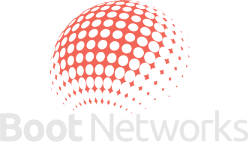Computer Security Tips
Whether you run a large corporation or run your own small business here’s some ideas how Boot Networks services and training can help protect your computers from spam, viruses, spy-ware, hackers, and other Internet intruders.
– Update your software. Regular software updates can be crucial to keeping your home office computer or your home office network as secure as possible. With Microsoft Update you can download critical security software updates for both Windows and Microsoft Office programs, such as Microsoft Word, Microsoft Excel, and Microsoft PowerPoint.
– Use an Internet firewall. An Internet firewall helps screen out hackers, viruses, and worms before they reach your home office computer or network from the Internet. If you use Windows XP Service Pack 2 (SP2) or higher, you already have a firewall and it is turned on by default.
– Use antivirus software. Computer viruses can have serious effects on your business. They can slow down your work; destroy important documents, and more. You can help protect your home office by using antivirus software and keeping it current.
– Use anti-spy ware software. Spy-ware can steal valuable information from your computer, take control of your Internet browser, or interfere with your work by sending you large amounts of advertising.
– Configure e-mail and instant messages (IM). If you rely heavily on e-mail and IM. Even if a message appears to come from someone you know, a file attached to an e-mail message or IM could contain a virus, so be sure to contact the sender by some other means to gain added assurance that the attachment is valid. Also, never reveal personal or financial information in a response to an e-mail request, no matter who appears to have sent it; your home office may be the target of a phishing scam.
– Back up your computer. Data backup should be as much a priority in your home office as it is in a large corporation. Create and maintain a backup schedule so that you don’t lose important files.
– Use strong passwords and change them often. In your home office, your passwords are the keys to unlocking all the financial and private information of your business. Strong passwords give you better security against intrusion by hackers and thieves. You can also use strong passwords to help protect files on certain Microsoft Office programs, such as Microsoft PowerPoint or Microsoft Word.
– Don’t let children use your business computer without your supervision. Ideally, you should not allow your children to use your home office computer. If your computer needs to serve both your business and family, be sure to supervise your children whenever they use it. Teach older children not to download programs or open e-mail attachments without your permission, because they might contain spy-ware or viruses.

